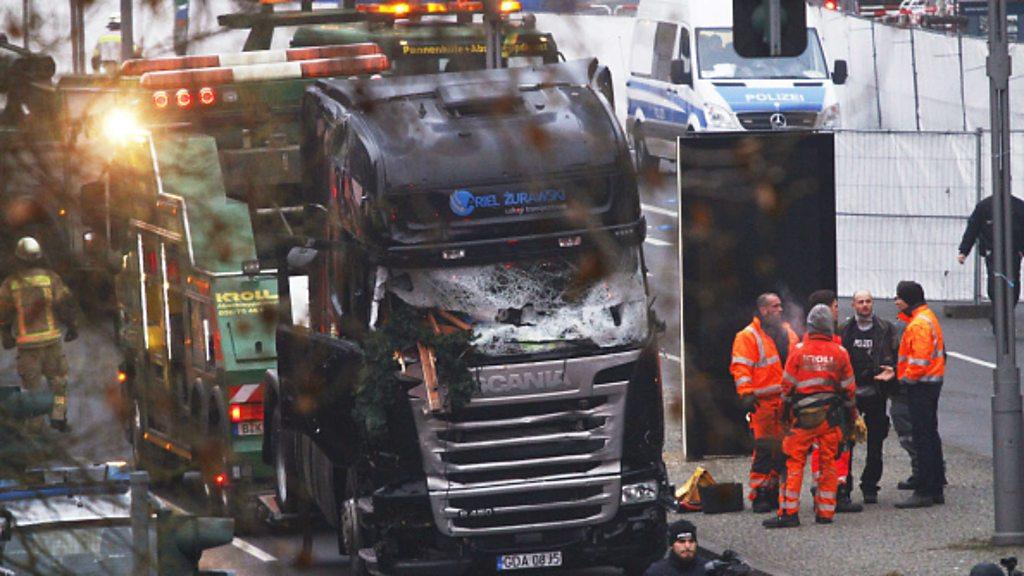Germany's rising tide of populism
- Published
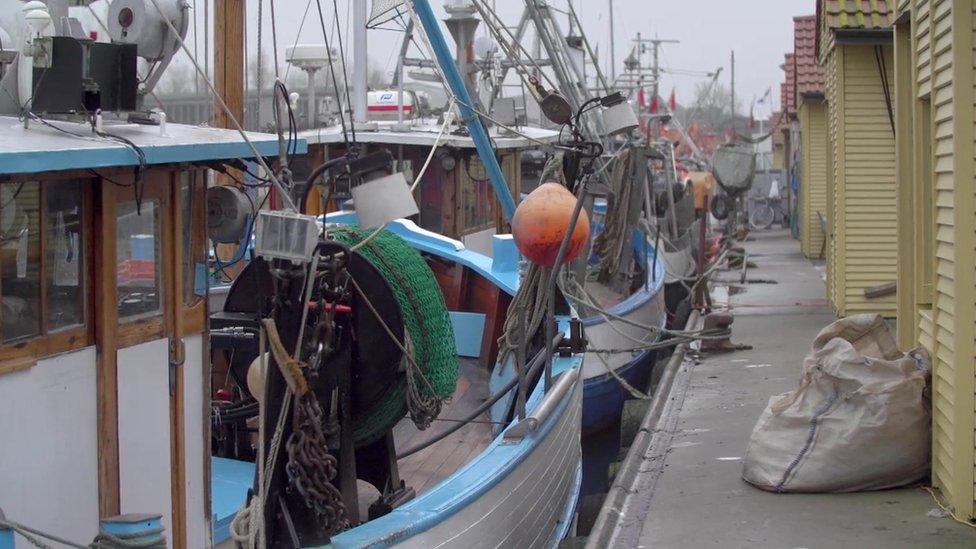
Germany's Baltic coastline can be a bleak place out of season. In the small fishing village of Freest, boats creak idly against their moorings. A lone fisherman, stark in his yellow overalls, stands on deck, scraping the scales from yesterday's catch.
It feels a long way from Berlin. And inside the quayside smokehouse, as she carefully threads sprats on to long metal skewers, fish factory worker Ines tells me she feels forgotten by Angela Merkel's government.
"They just look after the big cities," she says. "But these small communities up here - no. Nothing is being done for us. Nothing gets through to us."
It can be hard to make a good living here, especially in the winter. The workers in the smokehouse worry about unemployment. This is not a rich community and they feel it's time for political change.
Fertile ground then for Germany's right wing, anti-Islam party Alternative for Germany (AfD). A regular poll for the national broadcaster suggests it would take 15% of the vote if the general election was held tomorrow.
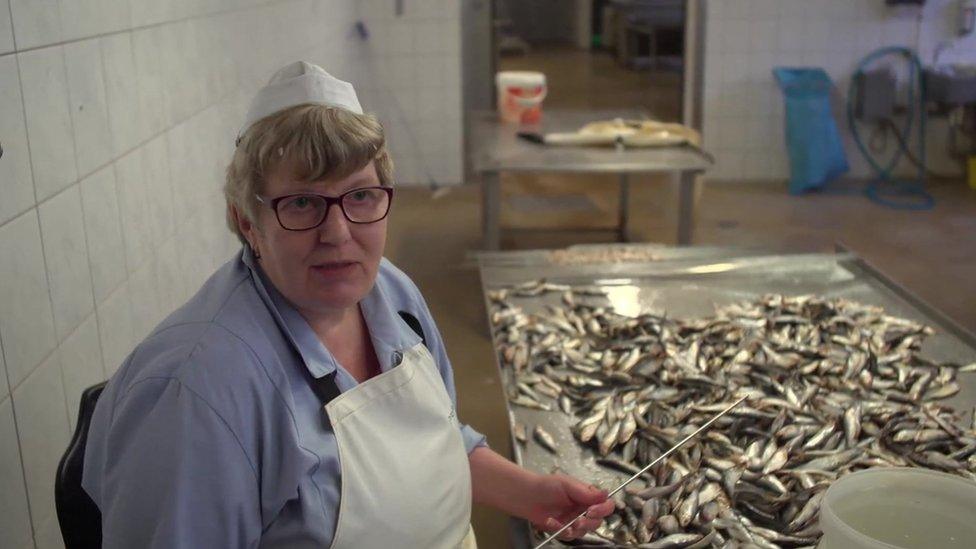
Ines. who works in a smoked fish factory, says she feels forgotten by the German government
The party may well complicate coalition building come the autumn. Angela Merkel's CDU party still leads those polls at 37%, but her junior coalition partner, the SPD, is at 20%
Roland delivers another load of slippery, silvery fish to the smokehouse. He pushes his woolly cap off and tells me AfD will be getting his vote.
"The other parties avoid the real problems," he explains. "Merkel just sticks to her views, even though she sees what she's got us into - like the terror attacks. If she hadn't brought those people into the country," he insists, "the victims of the Berlin Christmas markets would still be alive."
Freest is in the northern state of Mecklenburg Vorpommern. It is also home to Mrs Merkel's constituency. Last year AfD beat her Conservatives into third place in the regional election and now, they want to compound that humiliation by putting up a candidate - Leif-Erik Holm - directly against her.
Mr Holm, a smartly-dressed former radio presenter who believes a large proportion of Europe's Muslims hold radical views and want to establish a global caliphate, is, in reality, unlikely to take the chancellor's seat. But it's not impossible.
"We have a big problem with radical Islam and we need to talk about it," he tells me. "It's been taboo in Germany. The AfD broke that taboo and thank heavens people now talk about their fears. Just look at who's carrying out terror attacks in Europe, they're all extreme Islamists."
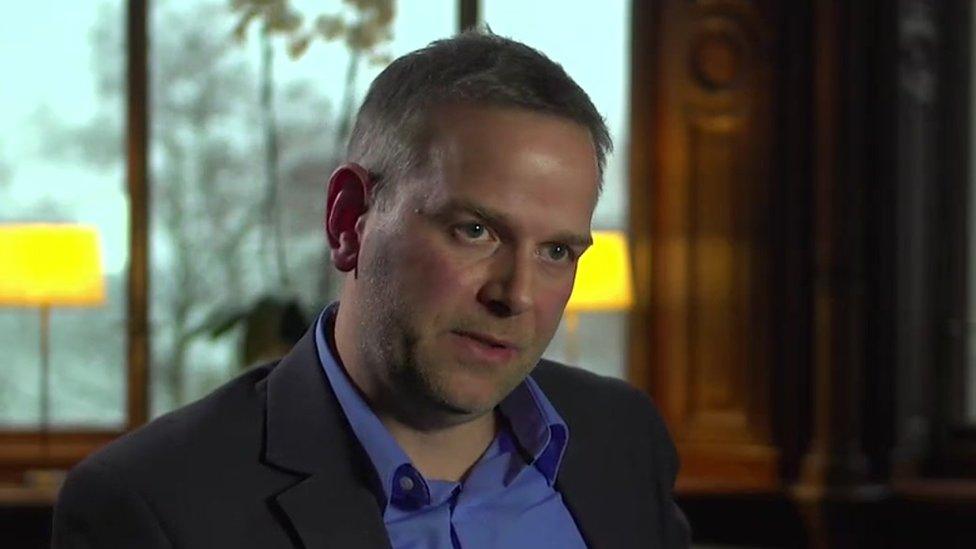
"We don't create fear. We talk about it," says the AfD's Leif-Erik Holm
It is AfD's vociferous anti-Islam, anti-migrant position which, critics argue, is key to its success. Certainly, support for what originally began as an anti-euro party surged during the latter part of the refugee crisis, as party leaders began to campaign against Mrs Merkel's asylum policy.
But Mr Holm rejects the notion that AfD is a one issue party, seeking political gain by whipping up fear of Muslim immigrants.
"During the regional election hustings we spoke with people in small towns and villages and realised fear was the most prominent theme. We don't create fear, we talk about it - the everyday fear that people have of terrorism, of uncontrolled mass immigration.
"That's what we work with as politicians. We make politics for the people."
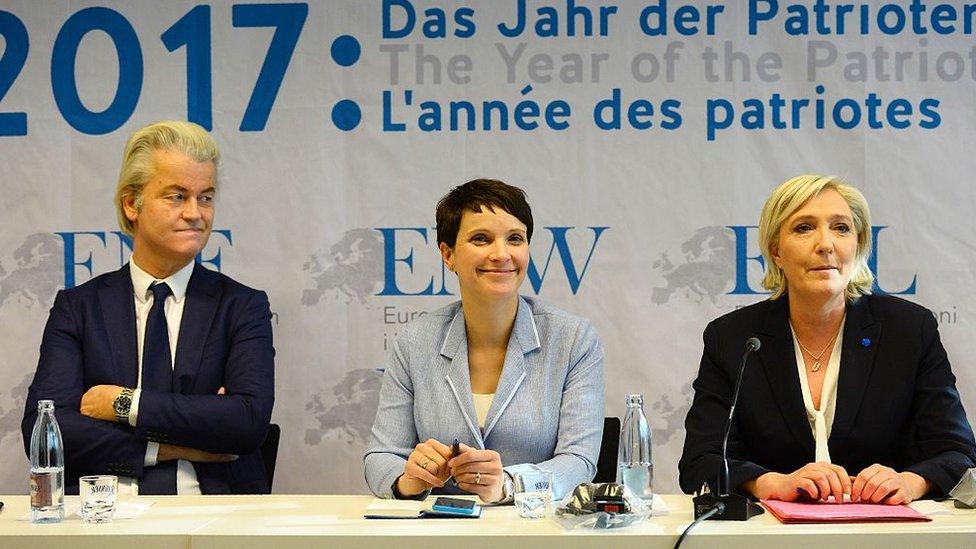
Geert Wilders, Frauke Petry and Marine Le Pen recently shared a platform in the German city of Koblenz
AfD's anti-EU rhetoric is also growing louder as it seeks to emulate the success of the giants of Europe's far right.
It recently hosted a rally of the right in the German city of Koblenz, sharing a stage - and a platform - with the French presidential candidate Marine le Pen and Geert Wilders, whose Freedom Party leads the polls ahead of the Dutch general election.
Both Ms Le Pen and Mr Wilders have pledged referendums on EU membership. AfD's manifesto now promises to pull Germany out if significant structural reforms are not implemented.
During the rally (from which the mainstream German broadcasters and press were banned) its leader Frauke Petry likened the EU to Nazi Germany or the Soviet Union and joined Ms Le Pen and Mr Wilders in their calls for a revolution in Europe.
This was a show of solidarity, a display of unity from Europe's right. Emboldened by Brexit and Donald Trump's victory, the leaders are keen to focus on the threefold message which unites them; a visceral dislike of Islam, a loathing of Mrs Merkel's refugee policy and that contempt for the EU.
And they believe 2017 will be their year.
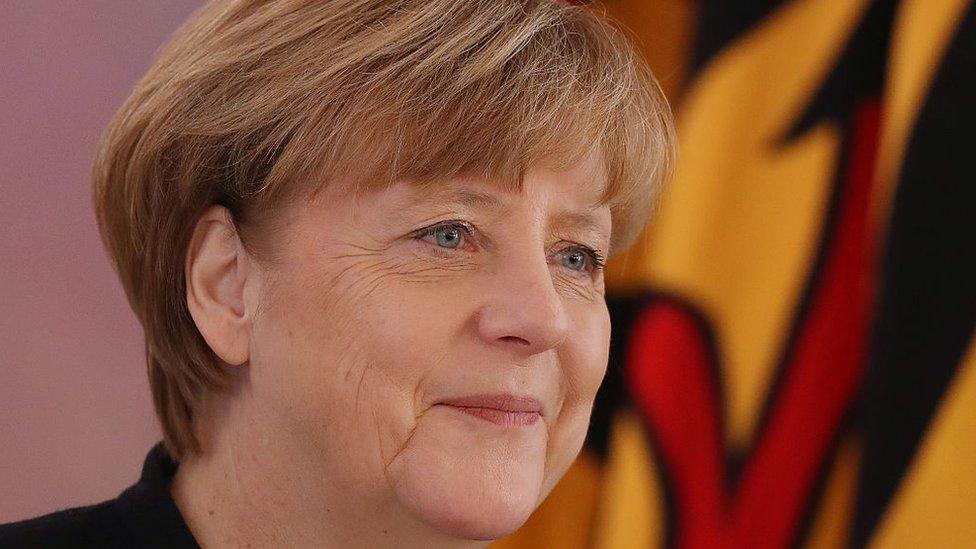
Angela Merkel is to stand for a fourth term as chancellor
It's hard to say whether they create, reflect or exploit social division, but an interesting recent German survey gave a fascinating glimpse into what might motivate AfD supporters.
The poll found, for example, that despite last year's terror attack in Berlin, 73% of those polled felt safe in Germany. But when the researchers asked AfD supporters, they found that only 34% felt secure.
Similarly, when asked whether life is better or worse than 50 years ago, 17% of Germans said it is worse, but this figure rises to 40% among AfD supporters.
In 2017, Europe's real election battles will take place in communities like Freest, where people feel forgotten by their national governments and left behind by establishment parties. If Europe's leaders want to halt the rise of the right, they must reconnect with those voters and regain their trust.
Because in this windblown harbour on the German coast, those who feel left out in the cold are warming to what Europe's right already refer to (prematurely perhaps) as the "patriotic spring".
This article is part of the 100 Days season, presented by Katty Kay and Christian Fraser, Monday - Thursday at 19:00 GMT on BBC News Channel, BBC Four and BBC World News.
- Published21 November 2016

- Published20 December 2016
